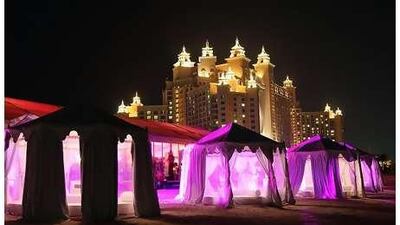The timing of Ramadan this year could be another challenge for the UAE's tourism industry in the difficult summer season. The summer heat tends to keep people from holidaying in the UAE, while business travel also slows. This year, Ramadan is expected to start earlier, about August 11, which is forecast to have a significant impact on the flow of business over the coming months. The timing of the holy month advances by about 10 days each year as it is based on the Islamic lunar calendar.
"The issue with Ramadan this year is the fact that it's in conjunction with the summer time," said Mohammed Deeb, the director of sales and marketing at the Holiday Inn Abu Dhabi. "This is completely different from recent years. The summer season is normally a low season anyway, so room occupancies will definitely be impacted." Hoteliers say one of their most important groups of customers, GCC tourists, is unlikely to travel during Ramadan, choking off a considerable amount of business.
This year, hotels in Abu Dhabi in particular have been much more competitive with their summer offers because there is a greater number of new properties in the market. Hotels in Dubai, having been hit hard by the global downturn in tourism, this year launched their summer offers earlier. Overall business is expected to fall as no alcohol is served in hotels during the day and guests have to eat and drink in a screened area during daylight hours in some properties. But some are looking to make up any of these lost food and beverage receipts with lavish iftars after sundown.
"We are not only relying on rooms but food and beverage revenues too," said Arshad Hussain, the director of business development at The Monarch Dubai hotel. While next month might be slower for travel in the region, the timing of Ramadan created an environment for healthy business this month and through most of September, Mr Hussain said. "This means that before Ramadan, GCC travellers are not going to be going too far from home," he said.
As Muslim GCC travellers are more likely to holiday closer to home ahead of the holy month, Mr Hussain predicts destinations such as Dubai and Beirut would benefit. In the past, Ramadan had fallen during the peak tourist season, which reduced high-yielding business, he said. Dubai lost corporate business last year as a result of this, with much of Ramadan falling in September, Mr Hussain said. Hoteliers in Dubai said business last month was relatively strong, despite increased competition for guests because of new properties that have opened in the emirate.
Discounts and the marketing efforts of the Dubai Department of Tourism and Commerce Marketing to attract business from different countries have helped to shore up occupancy levels, they said. In Dubai, occupancy at hotels in May increased by 8.1 per cent to 70.4 per cent compared with the same month last year, while room rates were down by 7.4 per cent to US$191.94 (Dh704.97). Muin Serhan, the general manager of Dubai's Tamani Hotel Marina, which is Sharia-compliant, said he was confident attractive offers and discounts would help lure customers during Ramadan, despite the heat.
"With so many tactical deals available the customer is going to get good value for their sterling and euro," Mr Serhan said. "We are positive that Ramadan will generate business from Europe as the timing falls directly on to the school holidays in the UK and mainland Europe." rbundhun@thenational.ae

